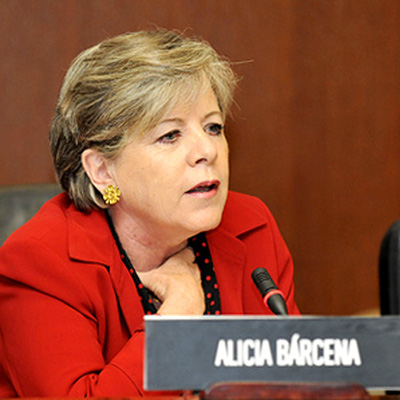ECLAC Promotes Social Covenants for Equality as Tools for Regional Security
Topic(s)
Alicia Bárcena emphasizes that achieving multidimensional security that is legitimate for everyone is a major challenge for Latin America and the Caribbean.

(28 October 2013) On Monday, the Executive Secretary of the Economic Commission for Latin America and the Caribbean (ECLAC), Alicia Bárcena, stated that the challenge of insecurity made it essential to promote social covenants for equality, with initiatives that recognize citizens as autonomous but also vulnerable subjects, as they depend on others to realize their life plans.
The senior United Nations official delivered this message as she took part in the commemoration of the 10th Anniversary of the Declaration on Security in the Americas, which was held at the Headquarters of the Organization of American States (OAS), in Washington, and was also attended by the Organization's Secretary-General, José Miguel Insulza.
During her speech, the most senior representative of the United Nations regional commission stated "For ECLAC, the region's great challenge is to guarantee security that is ‘legitimate for everyone', whereby the State regains its central and monopolistic role to narrow the inequality gaps in this area".
Alicia Bárcena added "Insecurity is another gap in the region that needs to be narrowed to achieve development", and declared that in recent years Latin America has achieved constant growth, lower poverty rates and - in some countries - even a reduction in inequality.
However, such macroeconomic changes do not always have an effect on values and criminal behaviour. She underlined that, in the fight against insecurity "State presence is essential".
The Executive Secretary advocated "a stop to the privatization of security" and called for the "promotion of security as a public good". She emphasized that "the privatization of security paradoxically leads to greater overall levels of insecurity. Security for the few always means insecurity for those excluded".
In Latin America, private security has risen and in Chile, for example, there are now more than 2 private guards for every one police officer.
She pointed out that "in ECLAC we believe that Latin American and Caribbean countries with high income inequality are more likely to be affected by violent crimes than more equitable societies". Economic growth, better income distribution and greater transparency all help to avoid violent crime.
The United Nations Development Programme (UNDP) has estimated that the costs of insecurity represent more than 5% of annual GDP in most countries, with striking differences among countries - ranging from 2% in Chile to 11% in El Salvador (this corresponds to State security spending and the costs borne directly by citizens).
These estimates are similar to ECLAC calculations for Central America (Guatemala, El Salvador, Honduras, Nicaragua and Costa Rica). Based on information available for 2006, ECLAC estimated that the economic cost of violence is 7.7% of subregional GDP. These costs were considered as health losses, institutional costs, public security, justice, private security spending and material losses.
According to ECLAC, between 2007 and 2010, public spending on defence, security and justice in Central America as a whole grew slightly but steadily, both in nominal terms and as a percentage of GDP. Spending on defence, security and justice in Central America in 2010 ranged from between 1.7% and 3.3% of GDP.
According to United Nations information, Latin America and the Caribbean has one of the world's highest rates of crime and violence, accounting for almost one third of the world's murders but only 8% of the global population, and an average of 25.6 murders for every 100,000 inhabitants (compared with 8.9 murders in Europe).
The main direct and indirect victims of the region's insecurity situation are women, children and young people.
Any queries should be sent to the ECLAC Public Information and Web Services Section.
E-mail: prensa@cepal.org; Telephone: (56 2) 2210 2040.
Country(ies)
- Latin America and the Caribbean